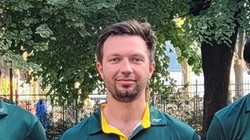I first moved to Australia to coach rowing on a gap year after university. I had seen an attractive package deal to coach at a school in regional Victoria and thought it sounded like the perfect year away from “real” life. Eight years later and I am now running the program that I first came to work for. During this period of time, I like to think I have had some key insights into some major cultural differences between rowing in Victoria and the UK. This blog post will explore a few reasons why Australian club rowing is struggling and potential areas for change.
To get the elephant in the room out of the way first – the geographical differences between the two are vast. The distance from Melbourne to Perth (where the most recent National Championships were held) is approximately the same as London to Moscow. Our boat trailer took four days to get across the country, which puts into perspective the clubs and schools in the UK who moan about a four-hour trip from London to Nottingham. As a result of this geographical size, Australia is split into states and territories and six of the seven have a rowing administrative body (there is no rowing in the Northern Territory). This body is responsible for the organisation of racing within each state or territory. As an aside, the basis for this comparison is my time as a junior/university rower in the UK and as a coach/club rower/head of rowing in Australia. There are other locations I would love to include in the comparison eventually, including New Zealand, the USA, and the Netherlands to cover off other large, state-based areas as well as smaller but densely packed countries.
The UK racing calendar is dominated by a series of large events that big programs will build there season around: Fours Head, Schools Head, Eights Head, Wallingford Regatta, National Schools Regatta, Metropolitan Regatta, Marlow Regatta and Henley Royal Regatta. Alongside this are a series of trials that run for the National team, taking place at different points in the season, either at Boston or at Caversham. The upshot is that if you are looking to be competitive at the pointy end, you will be entering your crews in these events. Generally speaking, you will see the same rowers at each of them and a sort of season long battle ensues. Schoolboy rowers in the UK will talk about the “triple” – winning Schools Head, National Schools, and Henley as one of the ultimate accomplishments.
Because of the state-based model in Australia this just is not the case as travel times and costs are prohibitive. Every state has its own State Championships, as well as a number of smaller regattas more analogous to your local club-based UK regattas e.g. York, Chester, Oxford etc. Alongside these state championships, most states will have an independent school regatta “head of the river” such as the APS Head of the River in Victoria, where 11 schools compete amongst themselves across various categories whilst the rest of the state looks in from the outside. In so far as national events that everyone attends, there are probably two that are getting there and one that is certain. This year’s Head of the Yarra saw crews racing from every state in eights in the centre of Melbourne. The closest thing to the UK Head of the River that Australia has. The New South Wales State Championships is fast becoming a mini nationals – crews from all the states compete here, with sometimes the exception of Western Australia.
The only truly national event – The National Championships, takes place over a week and does see junior, U21, U23 open age and club rowers compete in various categories, as well as an interstate race between all the states in different boat classes. The Nationals in Australia are the closest thing to Henley that the country has in terms of a large, multi-day event that sees rowers from the full spectrum of the country competing for prestigious titles. However, Henley it is not and my biggest concern with rowing in Australia and one shared by various state bodies here is that club rowing is struggling in what is stereotypically a highly sporting and competitive country. In my opinion, one of the reasons why is the lack of a suitable end of season focal event that club rowers can train towards.
The reason I have zoned in on a large scale end of season regatta is twofold:
- the success of Henley highlights that if there is a big regatta at the end of the season that everyone wants to win you will see strong entries and
- the current popularity of the Australian Nationals and the Head of the Yarra shows that people are willing to travel large distances to compete in Australia.
When we compare events available for Club rowers between the two, initially it seems reasonable, with the club eight and four offered in Australia on par in terms of number of events as the Thames, Wargrave, Wyfold and Brittania at Henley. However, when you drill down into the eligibility for the club events, the problem unfolds: there are no distinct events for student rowers in Australia and an almost complete absence of university rowing as it exists in the UK (see BUCS, and the Henley Student Events). The end result is that club events at the Nationals in Australia end up with rowers who train almost as much as full time athletes and your traditional 25 – 35-year-old club rower with a job and family doesn’t get a look in. At this point some people with throw the example of Thames RC at Henley at me – my rebuttal is that I do not think how Thames operate is good for the depth of club rowing in the UK.
My solution to the lack of club rowers is not particularly clear cut. Potentially you could limit those studying a degree to only competing in a student class of event at the nationals, but you run into the complication that Universities don’t tend to have distinct boat clubs. Melbourne University, UTS and Sydney University may have students rowing there that study there, but they also have a large number of students rowing there from other universities. In the instance of MUBC, they compete at the University Games in Australia, but often lose a number of their rowers to other university boat clubs, such as Monash University, that only exist to compete at University Games as the rowers are ineligible for MUBC. Maybe an open student category could work, whereby only current students can race in the event, and you can race for a club or University boat club, not necessarily the one you are enrolled at. By removing these rowers from the potential pool of competitors, you would free up the club events in Australia to be contested by genuine club crews from (Victorian examples only) clubs like Mercantile, Richmond and Banks.
I would subsequently hope to see club programs in Australia begin to grow and develop to put forward rowers to compete in these events who would have a hope of competing for and winning these events against their peers who also have jobs, families and later life commitments. Recently Rowing Victoria’s answer has been to lower the distance all club racing takes place over to 1000m, with the argument that club rowers don’t want to race 2000m because it is too challenging, too hard and requires too much training. My viewpoint is that this is false, and Henley provides the perfect example of club rowers who will work long and hard to compete over 2112m.
In my next post, I will be exploring the lack of retention in Australian rowing after students finish Year 12. This again is tied into the lack of university rowing and is exacerbated by the school and rowing calendar in the country and is something I believe could be amended by particular targeted policies in different states.
To conclude this piece: the health and depth of British club rowing is fantastic, and I would love to see Australia alter the events and eligibility requirements at it’s National Championships to foster the development of similar health and depth within it’s own club rowing system. For the long term health of the sport I fundamentally believe that having a strong club system is important.

